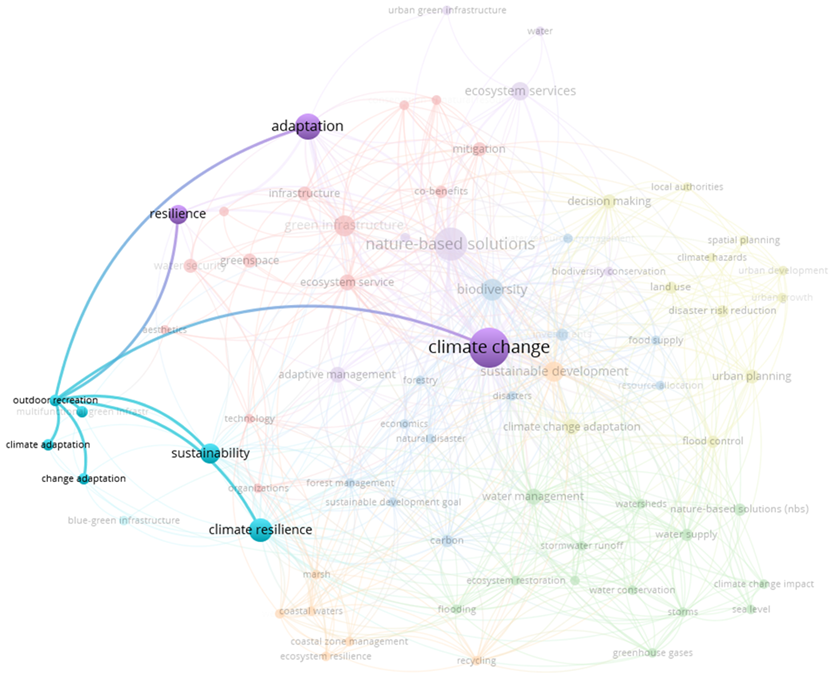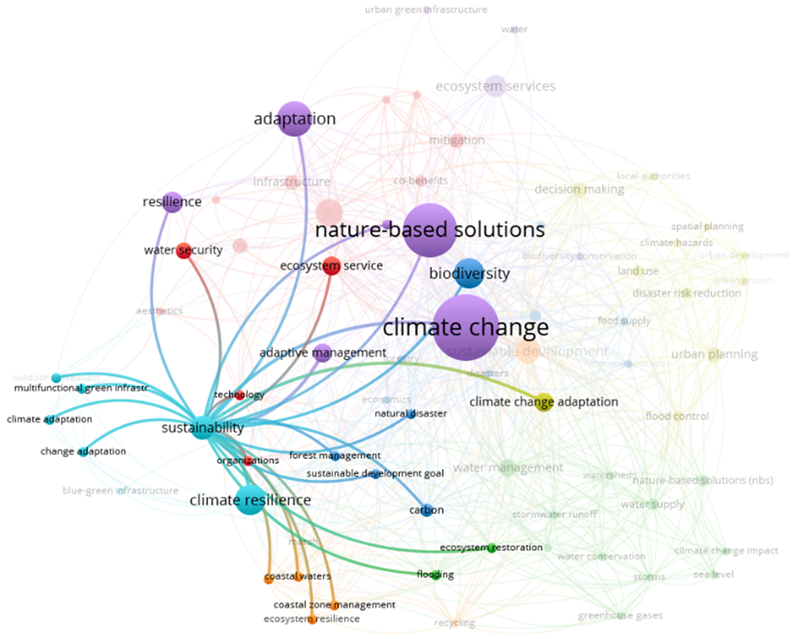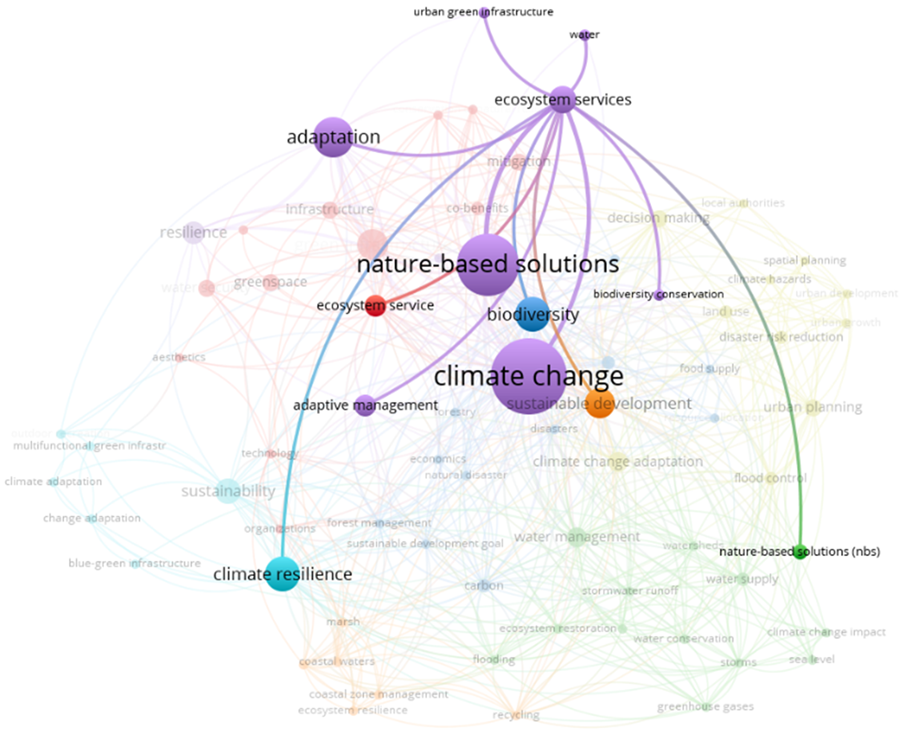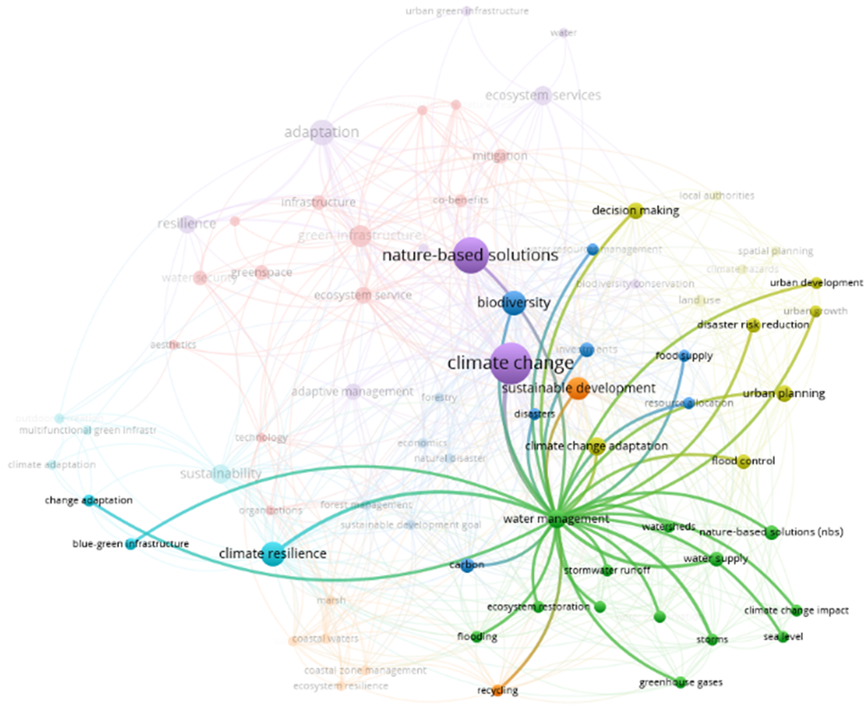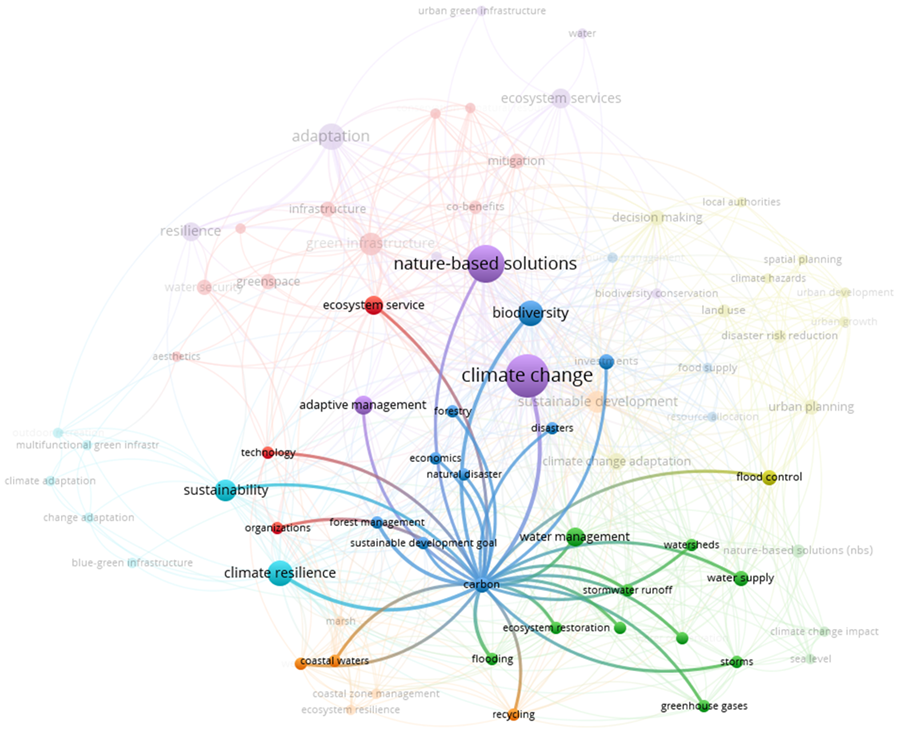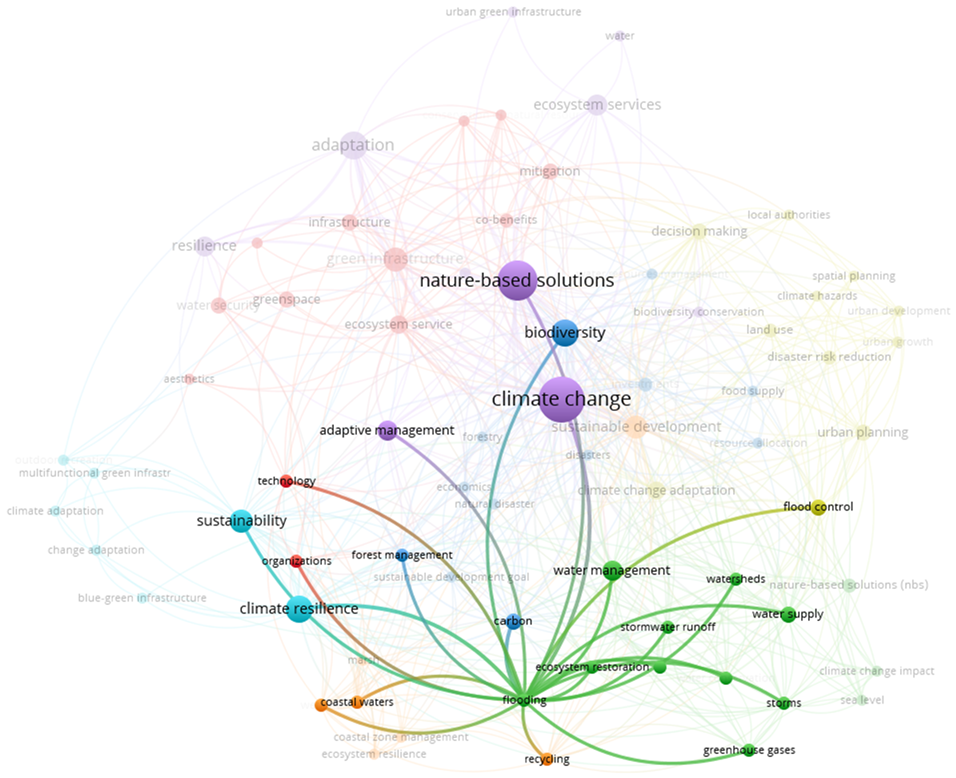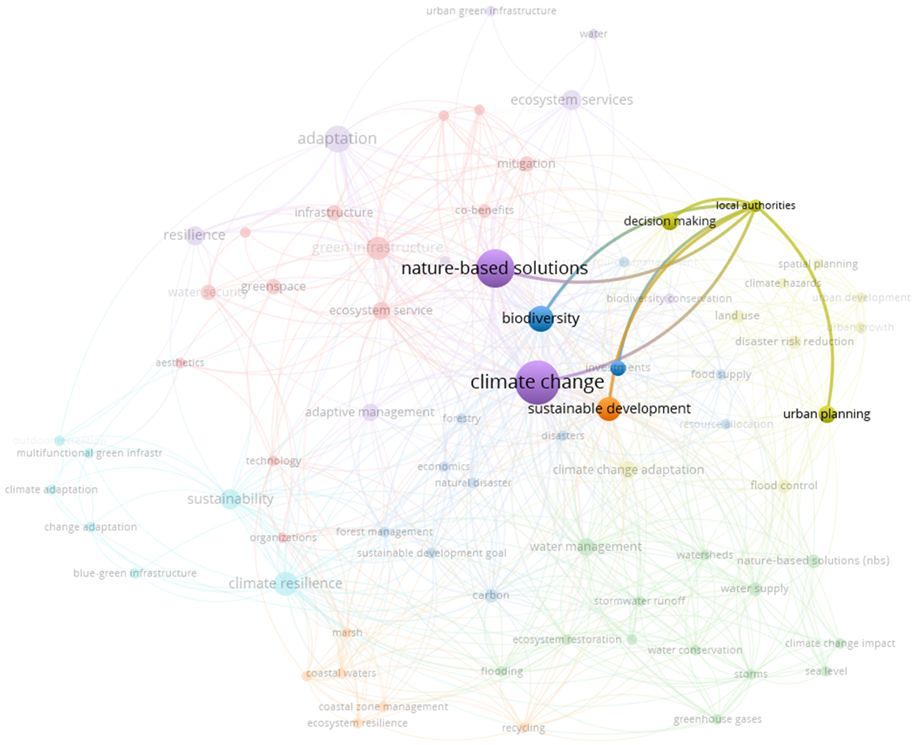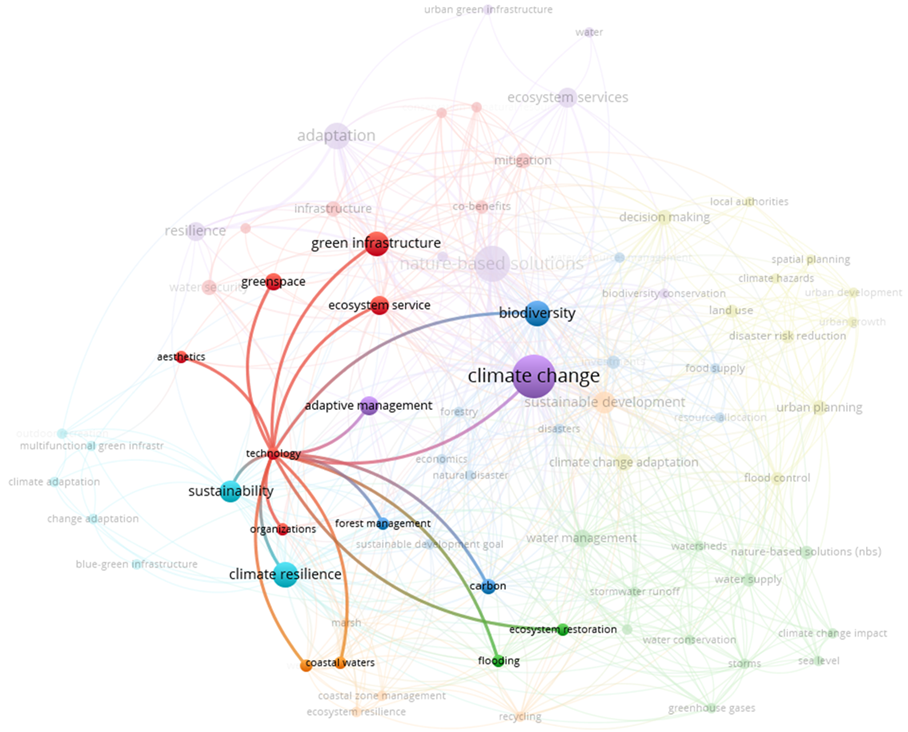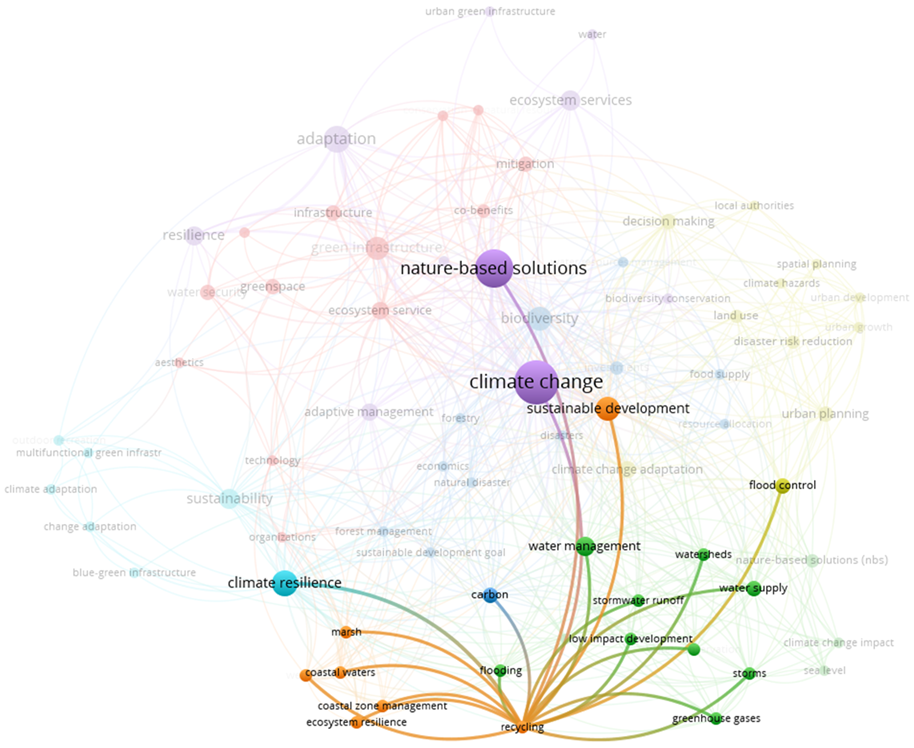Abstract
Currently, urban areas are confronting considerable challenges stemming from climate change. These challenges possess the potential to have profound implications for the well-being of residents, their means of making a living, and their own assets. Consequently, it is imperative to identify effective solutions that mitigate these effects on the urban environment. Nature-based solutions (NBSs), involving the utilization of natural resources and ecosystem services to alleviate the effects of climate change, have the potential of enhancing our capacity to develop cities that are more resistant to these challenges. To this end, this paper aims to extract some bibliographic data from available research articles on NBSs and climate resilience sought from the common search engines of Scopus, Web of Science, and Lens Base, and then the RStudio version 2022.12.00+353, VoSviewer version 1.6.20, and Biblioshiny-Bibliometrics version 2017 software tools were adopted to collate and analyze the literature data through science mapping analysis. In doing so, it was advocated that these two topics have not been extensively studied in their relationship to each other and that there is a large extent of existing knowledge gaps, the filling of which can foster the development of these ideas and thus help develop our cities in combating against climate change. Exploring the effectiveness of NBSs in boosting climate resilience is a critical research gap. More empirical studies are envisaged to assess the scalability and transferability of those effective NBSs in various regions or countries. Another research gap exists in comprehending the long-term effects on ecosystem services and community welfare. Research on socio-economic advantages, trade-offs, and unintended outcomes is essential for making well-informed decisions when applying various NBSs worldwide.
1. Introduction
The idea of nature-based solutions (NBSs) has developed as a broad term that includes concepts like green/blue/nature infrastructure, the ecosystem approach, and ecosystem services. Essentially, an NBS involves drawing insights from and utilizing nature to establish a sustainable and resilient urban environment, given the significant climate change challenges that cities are experiencing and will continue to face. These challenges have the potential to have serious repercussions on human health, livelihoods, and assets, particularly impacting the urban poor, informal settlements, and other vulnerable communities [1]. Climate change impacts encompass a range of issues, from an uptick in extreme weather events and flooding to heightened temperatures and health concerns. It is estimated that 90 of the world’s largest cities, home to nearly 50% of the world’s population, are located on ocean coasts. These areas, dangerously vulnerable to volatile weather and rising sea levels, face such a real and present danger that the United Nations estimates that nearly 200 million people a year will be displaced by rising sea levels by 2050 [2]. Building climate resilience cities, and along with that trying to slow down the process of global warming is important because if greenhouse gas emissions cannot be completely halted now, the earth will continue to warm steadily due to the accumulation of carbon dioxide in the atmosphere, so pragmatic mitigation strategies as well as effective adaptation measures have to be executed as early as possible [3]. Engaging in proactive measures to combat climate change is imperative for fostering international cooperation and policy development. Collaboration between countries, researchers, and policymakers is essential in formulating and implementing effective strategies or measures to reduce carbon emissions and adapt to a changing climate.
In addition to adapting cities to the phenomena associated with climate change, reducing their impact on the city, and reducing the emission and absorption of greenhouse gases in the atmosphere have become all the more vital nowadays. For this reason, a global plausible solution with minimal side effects on the ecosystem needs to be put forward to address this problem. NBSs can help us improve our capacity to build resilient cities at a lower cost than other strategies.
Urban climate resilience in cities refers to the capacity to sustain human and ecosystem functions in the face of disasters or crises, while also being able to adapt to sudden changes and continue to progress. This concept, also known as adaptive capacity, denotes a city’s ability to effectively manage and swiftly recover from challenges or emergencies [4]. A resilient city possesses a resilient infrastructure and has the capacity to transform a crisis into an opportunity for positive growth [5]. NBSs involve the strategic preservation or rehabilitation of natural environments to complement traditionally built infrastructure, known as gray infrastructure. This approach has the potential to diminish the risk of disasters and enhance the resilience and cost-effectiveness of services in developing nations [6]. In the fields of disaster risk management (DRM) and water security, NBSs can serve as eco-friendly infrastructure tactics that complement conventional gray infrastructure systems [7]. NBSs also have the potential to promote community welfare, generate ecological advantages, and make advancements toward Sustainable Development Goals (SDGs) in ways that gray infrastructure alone is incapable of achieving [8]. Hard structures are indisputable and known to be an efficient way to mitigate the risk of climate hazards [9]. However, these structures often negatively impact the landscape and limit opportunities for multifunctional value. NBSs represent a multifaceted approach defined as strategies or interventions derived from natural systems, and are characterized by their cost-effectiveness, as well as their ability to yield environmental, social, and economic advantages. NBSs aim to bolster resilience by drawing inspiration from nature and harnessing its support to address a variety of challenges [10]. It is a well-established fact that defining NBSs requires the integration of various scientific fields and experts with different backgrounds who approach NBSs from their own disciplinary standpoints [11]. Dorst et al. [12] proposed that NBSs should mainly address sustainability challenges that result from urbanization and climate change. In contrast, Kabisch et al. [13] highlighted the positive contribution of NBSs toward biodiversity restoration. Frantzeskaki et al. [14], on the other hand, viewed NBSs primarily through a socio-ecological lens. However, some studies emphasize the multifunctionality of NBSs and their capability to tackle multiple societal challenges at once [15]. Furthermore, an apparent tendency exists to conflate the existing related actions with the NBS concept, such as managing green–blue infrastructure (GBI), conservation strategies, implementing ecological/environmental engineering projects, and ecosystem-based management. Generally, aside from these cases, NBSs can provide numerous general and collateral benefits, including improving air quality by reducing carbon dioxide levels in the atmosphere, revitalizing and renovating public spaces and enhancing the quality of people’s lives, fostering biodiversity, improving micro-climates, and enhancing urban landscapes [16]. In the urban context, various terminologies can be employed to refer to NBSs. These include green infrastructure (GI), ecosystem-based adaptation (EbA), low-impact development (LID), water-sensitive urban design (WSUD), and best management practices [17]. These solutions have significant potential in urban settings as they can offer a wide range of ecosystem services [18,19,20]. NBSs can be employed independently or in conjunction with conventional infrastructure, facilitating urban resilience to climate change and enhancing resource management. Designing an NBS in the present context involves allocating space for natural elements and devising technical measures that are harmonized with the established surroundings, thereby establishing a new man-made green system capable of being integrated with our urban environment [21].
One of the primary knowledge gaps pertains to the long-term effectiveness and scalability of NBSs in different geographic regions and climatic conditions. Researchers are yet to fully understand how various nature-based interventions interact with complex environmental systems and how their efficacy evolves over time. Another prime area of concern that requires more attention is the economic valuation of NBSs and their cost-effectiveness as compared to traditional engineering approaches. Assessing the economic benefits and drawbacks of investing in NBSs can provide valuable insights for policymakers and stakeholders in prioritizing climate adaptation strategies.
The primary aim of this study is to investigate the prospective developments concerning both micro and macro intricacies associated with NBSs and climate resilience through a bibliographic review through the science mapping analysis of published research articles over these two domains. This endeavor will rely on existing research studies conducted on these two domains as a foundational basis for further exploration.
2. Methods of the Literature Search
A bibliographic review is significant within the realm of academic research as it entails the examination of various topics, keywords, and authors with the aim of establishing correlations among them while pinpointing the prevailing trends and focal points in scholarly publication pursuits. Such comprehensive assessments provide researchers with valuable insights into the evolutionary path of antecedent scholarly endeavors and offer glimpses into prospective developments [22]. This analysis aims to identify the predominant keywords in the article title, author-provided keywords, and abstract, thereby establishing a network that interconnects these keywords. The intensity of these connections is determined by the co-occurrence of these specific keywords across various articles. Therefore, the resulting network visualization illustrates both the frequency of a particular keyword across articles and its association with other linked keywords within the same articles [23].
By illuminating the interrelationships among different facets of research, bibliographic reviews serve to highlight the interconnectedness of certain domains while also pinpointing areas devoid of such connections. This discernment serves to unveil overlooked domains ripe for exploration. In addition, the use of previous studies that have used the bibliographic method to examine their topics and on the basis that bibliography can help to better analyze data in different topics and increase the citation approaches of the articles, the two research articles entitled “Artificial intelligence and machine learning in energy system: A bibliographic perspective [23]” and “Green marketing: A bibliographic perspective [24]” were investigated as the background references of using the bibliographic approach. Notably, the field of bibliometrics boasts numerous dedicated software tools tailored for facilitating in-depth bibliographic analyses [25]. However, the VoSviewer version 1.6.20 software tool, is considered one of the most suitable tools for generating network maps and organizing data. Co-developed by Waltman and van Eck [26], this software is freely available for use. The visual representations produced by VoSviewer encompass various entities like keywords, publications, and researchers that cater to the user’s interests. Each map focuses on a single type of entity, with the potential links between them being illustrated by arcs. These elements and connections collectively form a network, where entities are often organized into clusters based on thematic similarities. VoSviewer is employed to conduct bibliographic analyses and explore interconnections among different areas of research. The program generates network and bibliometric visualizations illustrating the relationships among data elements through shared keywords, authors, journals, and similar criteria [26]. Initially, our search was focused on a specific set of terms: “nature-based solution” (as title keywords) and “climate resilience” (in the context of topics) (WoS: ”nature based*”(Title) and “climate resilien*”(topic), Scopus: (TITLE-ABS-KEY (“climate resilien*”) and TITLE-ABS-KEY (“nature based*”), Lens: Title: (“climate resilien*”) OR (Abstract: (“climate resilien*”) OR Full text: (“climate resilien*”) AND (Title: (“nature based*”) OR (Abstract: (“nature based*”) OR (Keyword: (“nature based*”) OR Field of study: (“nature based*”)). The above protocols and word search forms are different depending on each database and the search limits within it. These aimed at identifying relevant academic literature in the specified field. Further, we extracted bibliographic data related to both NBSs and climate resilience from Scopus, Web of Science (WoS), and Lens Base. This search process was carried out in 2023 without any time frame restriction, and includes all the articles written and published in this field. In the second part, we merged the bibliographic files from three databases and removed the data that had been published twice using RStudio version 2022.12.00+353 software tool. Finally, we used the software tools (VoSviewer and Biblioshiny-Bibliometrics) for the bibliographic analysis. In total, 142 sources were extracted from the three search engine databases mentioned after removing identical data. Figure 1 illustrates the comprehensive process encompassing the initial keyword selection, data extraction from the Scopus, WoS, and Lens databases, as well as the subsequent classification and mapping of the obtained search results. In this research, a number of different disciplines, including environmental science, environmental studies, ecology, urban studies, regional urban planning, green sustainable science technology, water resources, biodiversity conservation, physical geography, etc. have been emphasized on this topic. By using these topics and the knowledge available in different disciplines, different research strategies can approach issues related to nature.
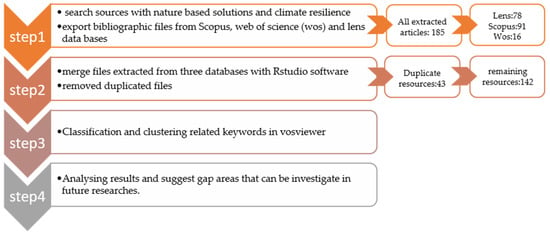
Figure 1.
Overall literature search and analysis procedures of the study.
3. Results of the Bibliographic Review and Science Mapping Analysis
Combining NBSs with climate resilience is a new topic and the first few studies were published in 2014. Since 2019, a lot of attention has been paid to this topic and it is increasing day by day until it peaks between 2021 and 2022. The focus and number of publications in this area have grown incredibly in 6 years compared to 2014. This investigation exclusively incorporated published documents from the earlier half of 2023. Therefore, the decline did not stem from a reduction in NBS publications. Figure 2 shows the number of published articles on NBSs and climate resilience between 2014 and mid-2023.
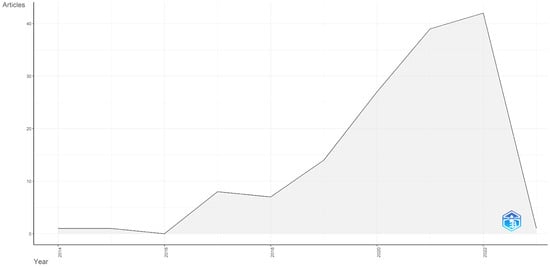
Figure 2.
The number of published papers related to NBSs and climate resilience (2014–mid-2023) in Biblimetrix software v. 2017.
3.1. Co-Occurrence Analysis
Figure 3 depicts the interrelations among NBSs and climate resilience within the domain of climate change. The schematic delineates six principal clusters, symbolizing distinct realms of inquiry, which collectively delineate the intricate framework of this nexus. These categories encompass resilience and adaptation (green), water management (orange), coastal zone dynamics (purple), sustainable development considerations (blue), ecosystem services evaluation (red), and disaster risk mitigation strategies (yellow).
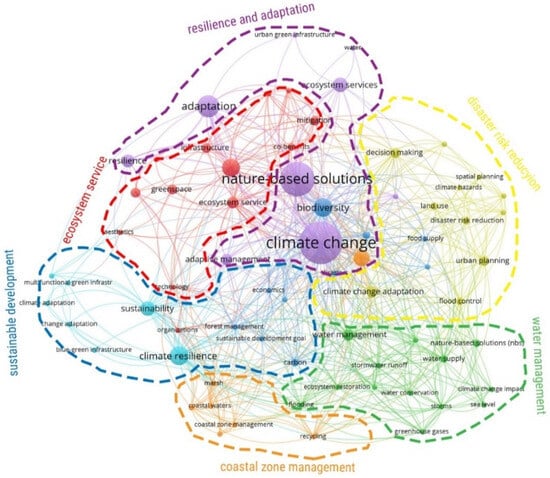
Figure 3.
A comprehensive network of climate change, NBSs, and climate resilience with other climate change-related areas such as water management, coastal zone, sustainable development, ecosystem service, disaster risk reduction, and adaptation.
The network connections depicted in Figure 4 exemplify the opportunity to expand scholarly inquiries into unexplored domains. These uncharted research frontiers predominantly encompass subjects pertaining to technology, economics, coastal areas, spatial organization, urbanization, sea level fluctuations, food provisioning, and resource allocation.
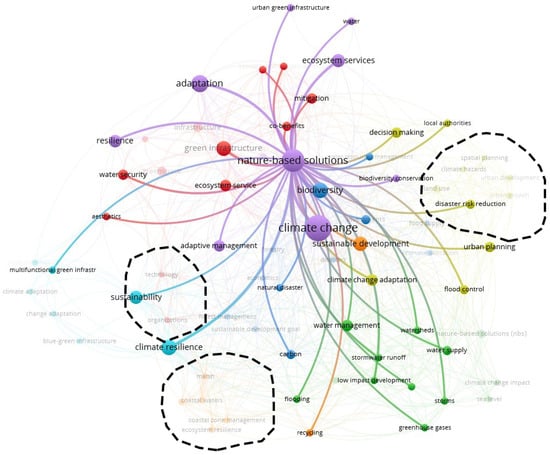
Figure 4.
Network connections between NBSs and unresearched gap areas.
In the case of climate resilience, a smaller network was formed, as shown in Figure 5, related to the topic of NBSs. The existence of an unknown research area, despite there being more articles on climate resilience than on NBSs, may indicate a research gap in this area, but as it is a relatively new area like NBSs, it is yet to expand to other areas. The potential area for expanding the use of climate resilience in addition to those mentioned in the section on NBS may be local authorities, land use, spatial planning, economics, resurce allocation, common interests, and biodiversity conservation. In order to explain why two separate graphs have been presented for NBSs and climate resilience, an example from the mentioned graphs is provided. For instance, the use of technology as a separate solution alongside NBSs or as a complement to enhance climate resilience has been highlighted in articles that address the intersection of these two concepts. Therefore, in the graph depicting climate resilience studies (Figure 3), a strong relationship and bold line between the two terms, i.e., technology and climate resilience, can be observed. On the other hand, in the graph of NBSs (Figure 4), this term has a faint relationship. This indicates that there has been limited quantitative research on the impact of technology on improving the performance of NBSs or on the effects for managing these solutions and the extent of assistance that technology can provide in this regard. Another example regarding spatial planning and its impact on increasing climate resilience or its influence on how NBSs are designed in urban areas can be considered.
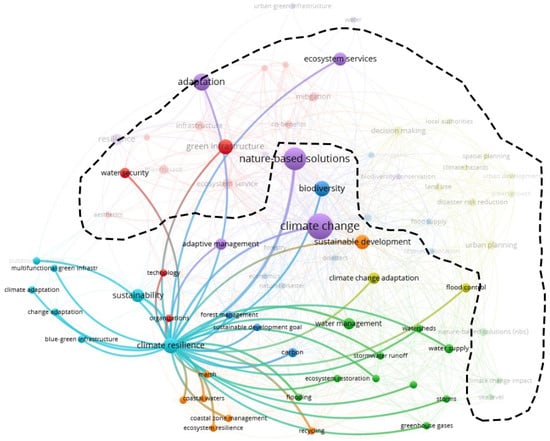
Figure 5.
Network connections between climate resilience and unresearched gap areas.
3.2. Research Trends
To explore the prevailing research direction concerning climate change, with a particular focus on NBSs and enhancing resilience to climate impacts, we employed the VoSviewer software to develop a chronological representation of the scholarly publications in the field. Figure 6 shows the research trend in NBSs and climate resilience. As the trend analysis requires reviewing all the papers available in the areas of NBSs and climate resilience, we used all the papers available in Scopus, WoS, and Lense, as mentioned earlier, and combined these data into one comprehensive file.
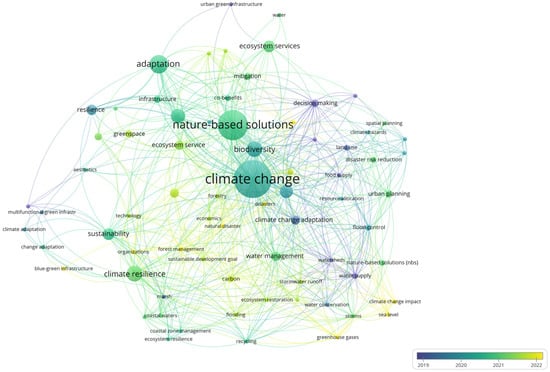
Figure 6.
Research trends of NBS- and climate resilience-related topics in the climate change field.
Regarding the main topics in the field of climate resilience and NBSs, as shown in Figure 6, our results show that in the period of 2019 to 2021, most research papers examine climate change adaptation, food supply, water management, land use, spatial planning, sustainability, and sustainable development, etc. During the period of 2021 to 2022, concepts such as disaster risk reduction, ecosystem services, blue–green infrastructures, carbon dioxide, forest management, sea level rise, and flood management dominated the majority of research papers, as shown in Figure 7. Sustainability-related topics such as environmental impacts, global warming, greenhouse gases, carbon dioxide, climate resilience, adaptation strategies, ecosystem services, green infrastructures, biodiversity, and climate change have also received much attention and were repeated in several studies as the main keywords. In addition, flooding and coastal zone management were widely addressed. However, if the area of the circles is considered, even though these topics have been raised in recent years, they still have a relatively small share of studies dedicated to them, emphasizing their novelty in the realm of NBSs and climate resilience. This does not imply that these topics have been saturated and thoroughly explored from all dimensions; rather, it indicates that there are still many theoretical gaps to be addressed. The diagram reflects the approximate number of documents available on each topic based on the area of each circle, clearly showing the relative attention given to this subject as compared to the others. As observed, coastal management has allocated a small circle to itself in the diagram.
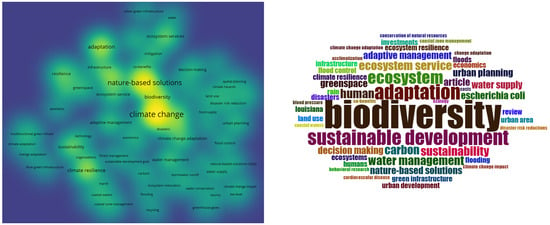
Figure 7.
The main focus of the research topics of NBSs and climate resilience (keyword density).
In Figure 8, it can see that the ten topics related to climate change and resilience have seen the largest increase in articles in recent years, with NBSs growing the most, with a steep increase that started in 2020 and peaked between 2022 and 2023. At the next level are topics directly related to climate change and its causes, of which the growth began in 2018 and peaked in 2022 and 2023. The next tiers include topics related to green infrastructure, climate resilience, ecosystem services, greenhouse gas reduction measures, and water resource sustainability and protection. As can be seen, issues related to climate resilience have increased since 2020. In 2022 and 2023, there was a relatively large growth in the academic community. In general, it can be said that 2020 represents a turning point for the expansion of research related to NBSs and climate resilience and, due to its novelty, offers high potential for further research in this area.
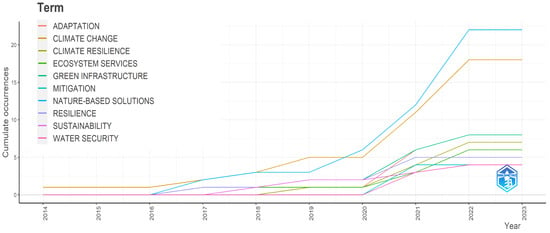
Figure 8.
Ten major topics that have grown the most in recent years (2014–mid-2023) in Biblimetrix software version 2017.
3.3. Research Gaps
Based on our findings, a compilation of research gaps in NBSs and climate resilience is presented in Table 1. The highlighted challenges have garnered substantial attention within the research community in recent years. Furthermore, the discourse delves into specific topics that remain underexplored or have only been marginally investigated. A thorough examination of these subjects through additional studies has the potential to advance the field considerably. We propose that integrating technology NBSs to mitigate climate-related risks, along with the exploration of diverse renewable energy sources, will significantly bolster forthcoming research efforts in these realms to yield a holistic outcome. As delineated in Table 1, certain subjects have been extensively explored while others have garnered less scrutiny. The limited connection between these subjects could stem from insufficient research endeavors or the feeble association denoted by the scant number of studies conducted on the particular subject matter. In the provided sources, each of them has referred to these gaps as research voids in the field of climate resilience and NBSs, and the images in Table 1 can potentially reflect the accuracy of these opinions that have been cited in the conclusions. These voids may be even more extensive but require examination in each specific area and must be addressed as conclusions by documents studied in this regard. For example, the possibility of designing multi-purpose areas for climate flexibility and recreation should be examined separately and in detail in a document and ultimately concluding that there is an apparent knowledge gap in this area. That is, while the article is bibliographic and should gather information from other articles to identify potential research voids and the paths that researchers have taken in this field, researchers can use this document to better select their study areas in the common subject of NBSs and climate resilience. Therefore, first, research voids have been collected as much as possible from published documents that have referred to them as research voids, and on the other hand, using the VOSviewer chart and showing the weak relationship with the mentioned voids, the accuracy of the information stated in the sources has been addressed.

Table 1.
Research gaps in NBSs and climate resilience.
3.4. Academic Journals in the NBS and Climate Resilience Fields
In order to enhance comprehension of the studies pertaining to nature-based solutions (NBSs) and the enhancement of climate resilience, an examination was conducted on the content published in prominent journals within this domain. As depicted in Figure 9, the primary journals wherein a significant volume of research on NBSs and climate resilience is disseminated are presented. The figure also illustrates the prevailing research trajectory through an analysis of the research articles submitted to various journals. It is evident from the data that initial research contributions on each topic are typically debuted in journals such as Water and Coastal Management, Ecology and Society, and the Journal of Climate Change. Subsequently, following the presentation of concepts in these journals, scholarly publications provide more specialized applications of research findings within these domains. Recent publications in the areas of NBSs and climate resilience have been published in journals such as Frontiers in Sustainable Cities, Climate Change, Land Use Policy, Forest Ecology, and Management.
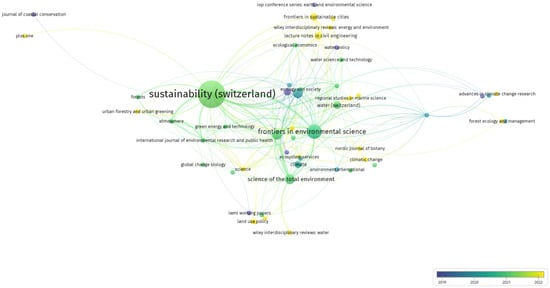
Figure 9.
Primary publications in the field of natural and built environments and topics related to climate resilience within the discourse of climate change, along with an analysis of research distribution among various academic journals and identification of the journal with the highest volume of publications.
As revealed in Figure 10 and Figure 11, most citations in the areas of NBSs and climate resilience are found in journals such as Environmental Science and Policy, Frontiers of Environmental Sciences, and general environmental science journals. Figure 10 additionally displays the quantity of academic papers that were submitted to a variety of scholarly journals from 2014 to 2022.
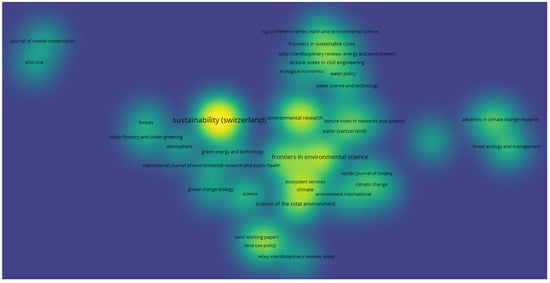
Figure 10.
The number of research studies published in different academic journals.
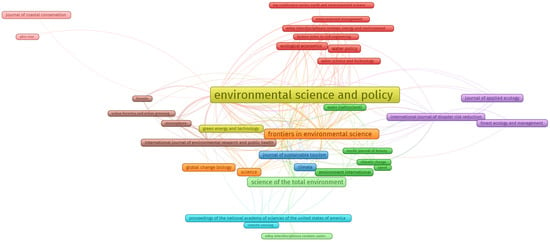
Figure 11.
Primary journals within the field of natural and built systems and topics related to climate resilience in the domain of climate change, and the journals that have received higher citations.
As can be discerned, the journals Sustainability (Switzerland), Frontiers in Environmental Science, and Science of the Total Environment published most of these research papers.
3.5. Authors and Pioneering Countries Researching within the NBS and Climate Resilience Fields
Figure 12 shows the authors with the most publications, such as Frantzeskaki, Berry, Anderson, Losada, Raymond, etc., and each cluster shows the group of authors who have worked in the field of NBSs and climate resilience. Figure 13 shows the authors most frequently cited on the topic of climate resilience and NBSs.
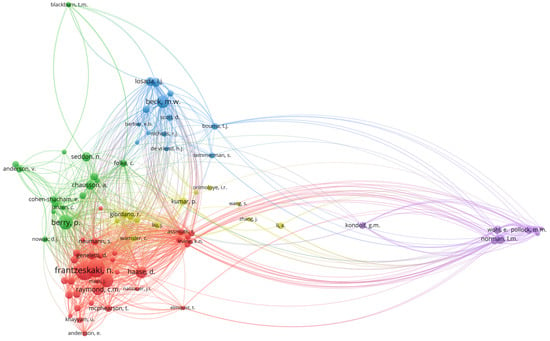
Figure 12.
Authors that research NBSs and climate resilience, and their corresponding number of published documents.
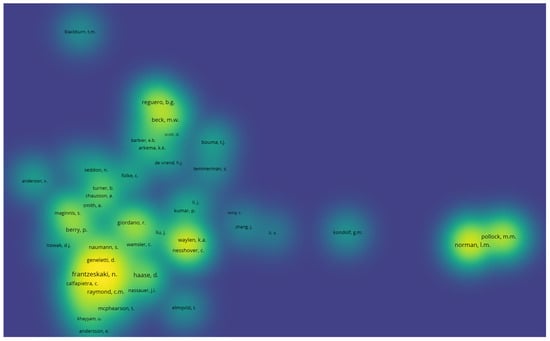
Figure 13.
Distribution of the most cited authors within the NBS and climate resilience fields.
The countries where most research on NBS and climate resilience has been conducted are shown in Figure 14. Of the countries listed, the United States, the United Kingdom, and the Netherlands top the list. The most recent countries to conduct research on NBS and climate resilience between 2021 and 2022 are Germany, Spain, Japan, France, Switzerland, the United States, and Australia. This shows that the most important countries have joined within one year, indicating the importance of the topic.
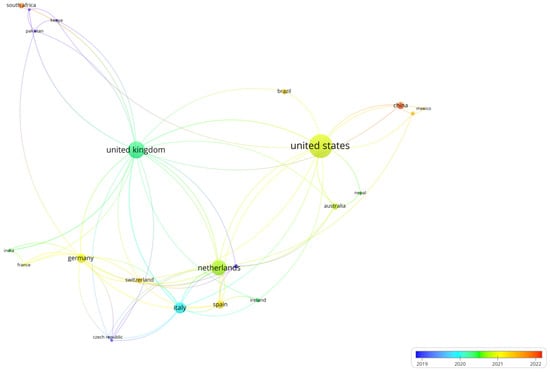
Figure 14.
Countries that work within the NBS and climate resilience fields.
4. Discussion of the Review Findings and Conclusions
The results show that in 2014, the first studies were published in small numbers. Since 2017, NBSs and climate resilience became more important, especially after 2019, when the number of articles on NBSs and climate resilience increased. Within 6 years, the number increased tenfold compared to 2014. By analyzing the occurrence of keywords related to NBSs and climate resilience in the articles, it was determined that the existing literature can be categorized into six overarching groups: resilience and adaptation, water management, coastal areas, sustainable development, ecosystem services, and disaster risk reduction. Our study has uncovered many neglected areas where NBSs and climate resilience can be implemented. Some of these areas that need further investigation are outdoor recreation, sustainability, water management, ecosystem services, carbon mitigation and absorption, flooding, local government authorities and stakeholders, technology, and recycling. In relation to nature-oriented approaches, apart from the uninvestigated domains identified in the preceding sections, there exist concerns pertaining to technological advancements, economic considerations, coastal management, land use strategies, urban expansion, sea level escalation, food provisioning, and allocation of resources. Regarding climate resilience, the issues mentioned included local governance, land use, spatial planning, economics, resource allocation, co-benefits, biodiversity conservation, and many other applications. We also examined in detail the journals in which the studies were published. Research indicates that recent publications addressing NBSs and climate resilience tend to be featured in emerging academic journals over time. Notably, Sustainability (Switzerland), Frontiers in Environmental Science, and Science of the Total Environment stand out as the primary platforms for disseminating articles on the subject matter.
As can be seen in the development graph in Figure 15, some topics in the articles are mainly used side by side and in conjunction with each other and have formed a group, or topics such as NBSs with a sponge city with a medium level of topic development. Based on nature, along with seeing its benefits, these topics have little relevance and require high development. Topics related to water management have little development in the articles and are one of the new emerging topics in this area of the study. On the other hand, topics related to climate resilience, green infrastructure, and adaptation strategies have high relevance and low development, and are among the basic topics for all topics in this study area. Topics such as green roofs, food security, urban agriculture, co-benefits of NBSs, spatial planning to reduce disaster risk, and the use of blue–green infrastructure are among the topics with applications that still require more research and knowledge, and positions such as sustainable development, climate adaptation, climate change mitigation, biodiversity, and sponge cities are among the driving and stimulating topics in this collection of articles. For this reason, issues related to economic water management and the benefits of using NBSs, as well as land use planning to reduce the risk of natural hazards and the use of water and green infrastructure, may be appropriate topics for further research.
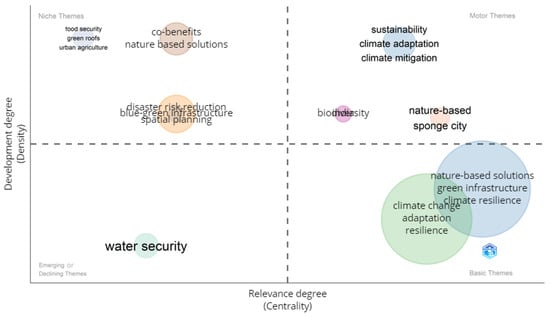
Figure 15.
Development plot for NBSs and climate resilience research.
The perceived challenges that need to be addressed by NBSs are multi-dimensional and complex; therefore, the selection and evaluation of NBSs and related actions require the involvement of a wide spectrum of stakeholders, multidisciplinary teams, policymakers, and decision makers. Each policy or NBS implementation process should consider how to effectively monitor and evaluate the impact of interventions. One of the limiting factors is the lack of comprehensive and sufficient information and data regarding the impact, effectiveness, and consequences of NBSs on climate resilience. Sometimes, it is difficult to gain access to large and diverse datasets that are not always available for use and investigation. Another prime concern in this field is that some research studies may face methodological limitations, and their results may not be generalizable to other times and places. They may also encounter several profound challenges such as cultural resistance, resource management, and high costs. Moreover, sudden changes in urban development, social development patterns, and weather conditions can lead to serious drawbacks and damages to the implemented nature-based and climate resilient solutions. Therefore, future research in this area should aim to reduce uncertainties as much as possible, despite being time-consuming and costly.
In general, it can be said that the application of climate resilience issues and NBSs has received a lot of attention, as it is a very new topic that has experienced significant growth in recent years but has not been considered in many aspects that we have talked about in this research. One of the key issues is how to combine technology in a way that co-exists with NBSs, and whether these two can be used together in urban spaces and to what extent they can influence each other. Another aspect that warrants further examination is the capability of NBSs to establish versatile and multi-purpose areas to enhance climate resilience or leverage ecosystem services for this purpose. It can be noted that although the use of NBSs can increase climate resilience and prevent or reduce risks, and is very effective, many countries, especially in Asia and Africa, have not yet moved into this area or have only a small share of such studies despite facing such risks daily. It has been noted that most nature-based interventions can be implemented at different scales and a low cost, and with the help of nature due to the economic crisis in the world that most countries face and the high cost of implementing other strategies to reduce natural hazards. Nowadays, this can be regarded as a vital breakthrough.
Author Contributions
Conceptualization, T.H. and F.V.; methodology, T.H.; software, T.H. and F.V.; validation, T.H. and F.V.; formal analysis, T.H. and H.S.; investigation, T.H.; resources, D.W.M.C., T.H. and H.S.; data curation, D.W.M.C., F.V. and T.H.; writing—original draft preparation, F.V. and T.H.; writing—review and editing, D.W.M.C. and H.S.; visualization, T.H., D.W.M.C., F.V. and H.S.; supervision, T.H.; project administration, H.S.; funding acquisition, D.W.M.C. All authors have read and agreed to the published version of the manuscript.
Funding
This research received no external funding.
Data Availability Statement
The original contributions and data presented in the study are included in the article, and further inquiries can be directed to the corresponding authors.
Conflicts of Interest
The authors declare no conflicts of interest.
References
- World Bank. Analysis of Heat Waves and Urban Heat Island Effects in Central European Cities and Implications for Urban Planning; eLibrary, World Bank Group: Washington, DC, USA, 2020. [Google Scholar] [CrossRef]
- Harms, A. Under the climate radar: Disaster and displacement in the Bengal Delta. In Climate Justice and Migration: Mobility, Development, and Displacement in the Global South; Heinrich Böll Stiftung: Berlin, Germany, 2020; pp. 150–155. [Google Scholar]
- Clarke, B.; Otto, F.; Stuart-Smith, R.; Harrington, L. Extreme weather impacts of climate change: An attribution perspective. Environ. Res. Clim. 2022, 1, 012001. [Google Scholar] [CrossRef]
- Lehmann, S. Nature in the Urban Context: Renaturalisation as an Important Dimension of Urban Resilience and Planning. Modulo Arquit. CUC 2021, 26, 161–190. [Google Scholar] [CrossRef]
- Lehmann, S. Growing biodiverse urban futures: Renaturalization and rewilding as strategies to strengthen urban resilience. Sustainability 2021, 13, 2932. [Google Scholar] [CrossRef]
- Ozment, S.; Ellison, G.; Jongman, B. Nature-Based Solutions for Disaster Risk Management: Booklet; United Nations Office for Disaster Risk Reduction (UNDRR): Geneva, Switzerland; The World Bank: Washington, DC, USA, 2019. [Google Scholar]
- Ferreira, C.S.; Kalantari, Z.; Hartmann, T.; Pereira, P. Nature-Based Solutions for Flood Mitigation: Environmental and Socio-Economic Aspects; Springer Nature: Berlin, Germany, 2022. [Google Scholar]
- Scheiffer, R.G. Nature Based Solutions for Water Sensitive Communities: Governance Challenges and Opportunities in the Subsystem Vale do Lobo, Campina de Faro aquifer, Loulé, Portugal. Ph.D. Thesis, Universidade do Algarve, Faro, Portugal, 2023. [Google Scholar]
- Bosher, L.; Dainty, A. Disaster risk reduction and ‘built-in’resilience: Towards overarching principles for construction practice. Disasters 2011, 35, 1–18. [Google Scholar] [CrossRef] [PubMed]
- Faivre, N.; Fritz, M.; Freitas, T.; De Boissezon, B.; Vandewoestijne, S. Nature-Based Solutions in the EU: Innovating with nature to address social, economic, and environmental challenges. Environ. Res. 2017, 159, 509–518. [Google Scholar] [CrossRef] [PubMed]
- Wild, T.; Freitas, T.; Vandewoestijne, S. Nature-Based Solutions: State of the Art in EU-Funded Projects; Publications Office of the European Union: Luxembourg, 2020. [Google Scholar]
- Dorst, H.; Van der Jagt, A.; Raven, R.; Runhaar, H. Urban greening through nature-based solutions–Key characteristics of an emerging concept. Sustain. Cities Soc. 2019, 49, 101620. [Google Scholar] [CrossRef]
- Kabisch, N.; Frantzeskaki, N.; Pauleit, S.; Naumann, S.; Davis, M.; Artmann, M.; Haase, D.; Knapp, S.; Korn, H.; Stadler, J.; et al. Nature-based solutions to climate change mitigation and adaptation in urban areas: Perspectives on indicators, knowledge gaps, barriers, and opportunities for action. Ecol. Soc. 2016, 21, 39. [Google Scholar] [CrossRef]
- Frantzeskaki, N.; McPhearson, T.; Collier, M.J.; Kendal, D.; Bulkeley, H.; Dumitru, A.; Walsh, C.; Noble, K.; Van Wyk, E.; Ordonez, C.; et al. Nature-based solutions for urban climate change adaptation: Linking science, policy, and practice communities for evidence-based decision-making. BioScience 2019, 69, 455–466. [Google Scholar] [CrossRef]
- Dumitru, A.; Wendling, L. Evaluating the Impact of Nature-Based Solutions: A Handbook for Practitioners; European Commission EC: Brussels, Belgium, 2021. [Google Scholar]
- Sowińska-Świerkosz, B.; García, J. What are Nature-based solutions (NBS)? Setting core ideas for concept clarification. Nat.-Based Solut. 2022, 2, 100009. [Google Scholar] [CrossRef]
- Fletcher, T.D.; Shuster, W.; Hunt, W.F.; Ashley, R.; Butler, D.; Arthur, S.; Trowsdale, S.; Barraud, S.; Semadeni-Davies, A.; Bertrand-Krajewski, J.-L. SUDS, LID, BMPs, WSUD, and more–The evolution and application of terminology surrounding urban drainage. Urban Water J. 2015, 12, 525–542. [Google Scholar] [CrossRef]
- Coutts, C.; Hahn, M. Green infrastructure, ecosystem services, and human health. Int. J. Environ. Res. Public Health 2015, 12, 9768–9798. [Google Scholar] [CrossRef]
- Pacetti, T.; Castelli, G.; Bresci, E.; Caporali, E. Water values: Participatory water ecosystem services assessment in the Arno River basin, Italy. Water Resour. Manag. 2020, 34, 4527–4544. [Google Scholar] [CrossRef]
- Sarvari, H.; Rakhshanifar, M.; Tamošaitienė, J.; Chan, D.W.M.; Beer, M. A Risk Based Approach to Evaluating the Impacts of Zayanderood Drought on Sustainable Development Indicators of Riverside Urban in Isfahan-Iran. Sustainability 2019, 11, 6797. [Google Scholar] [CrossRef]
- Matthews, J.; Cruz, E.O.D. Integrating Nature-Based Solutions for Climate Change Adaptation and Disaster Risk Management: A Practitioner’s Guide; ADB Publications: Metro Manila, Philippines, 2022. [Google Scholar] [CrossRef]
- Donthu, N.; Kumar, S.; Mukherjee, D.; Pandey, N.; Lim, W.M. How to conduct a bibliometric analysis: An overview and guidelines. J. Bus. Res. 2021, 133, 285–296. [Google Scholar] [CrossRef]
- Entezari, A.; Aslani, A.; Zahedi, R.; Noorollahi, Y. Artificial intelligence and machine learning in energy systems: A bibliographic perspective. Energy Strategy Rev. 2023, 45, 101017. [Google Scholar] [CrossRef]
- Lievano Pulido, Y.P.; Ramon-Jeronimo, M.A. Green Marketing: A Bibliographic Perspective. Sustainability 2023, 15, 16674. [Google Scholar] [CrossRef]
- Daneshgar, S.; Zahedi, R.; Farahani, O. Evaluation of the concentration of suspended particles in subway stations in Tehran and its comparison with ambient concentrations. Ann. Environ. Sci. Toxicol. 2022, 6, 19–25. [Google Scholar] [CrossRef]
- Van Eck, N.; Waltman, L. Software survey: VOSviewer, a computer program for bibliometric mapping. Scientometrics 2010, 84, 523–538. [Google Scholar] [CrossRef] [PubMed]
- Scott, M.; Lennon, M.; Haase, D.; Kazmierczak, A.; Clabby, G.; Beatley, T. Nature-based solutions for the contemporary city/Re-naturing the city/Reflections on urban landscapes, ecosystems services and nature-based solutions in cities/Multifunctional green infrastructure and climate change adaptation: Brownfield greening as an adaptation strategy for vulnerable communities?/Delivering green infrastructure through planning: Insights from practice in Fingal, Ireland/Planning for biophilic cities: From theory to practice. Plan. Theory Pract. 2016, 17, 267–300. [Google Scholar] [CrossRef]
- Zwierzchowska, I.; Fagiewicz, K.; Poniży, L.; Lupa, P.; Mizgajski, A. Introducing nature-based solutions into urban policy–facts and gaps. Case study of Poznań. Land Use Policy 2019, 85, 161–175. [Google Scholar] [CrossRef]
- Chou, R.-J. Achieving successful river restoration in dense urban areas: Lessons from Taiwan. Sustainability 2016, 8, 1159. [Google Scholar] [CrossRef]
- Sabale, R.; Venkatesh, B.; Jose, M. Sustainable water resource management through conjunctive use of groundwater and surface water: A review. Innov. Infrastruct. Solut. 2023, 8, 17. [Google Scholar] [CrossRef]
- Yu, P.; Zhang, S.; Yung, E.H.K.; Chan, E.H.W.; Luan, B.; Chen, Y. On the urban compactness to ecosystem services in a rapidly urbanizing metropolitan area: Highlighting scale effects and spatial non–stationary. Environ. Impact Assess. Rev. 2023, 98, 106975. [Google Scholar] [CrossRef]
- Almenar, J.B.; Petucco, C.; Sonnemann, G.; Geneletti, D.; Elliot, M.; Rugani, B. Modeling the net environmental and economic impacts of urban nature-based solutions by combining ecosystem, em services, system dynamics, and life cycle thinking: An application to urban forests. Ecosyst. Serv. 2023, 60, 101506. [Google Scholar] [CrossRef]
- Alcalá-Herrera, R.; Moreno, B.; Aguirrebengoa, M.; Winter, S.; Robles-Cruz, A.B.; Ramos-Font, M.E.; Benítez, E. Role of Agricultural Management in the Provision of Ecosystem Services in Warm Climate Vineyards: Functional Prediction of Genes Involved in Nutrient Cycling and Carbon Sequestration. Plants 2023, 12, 527. [Google Scholar] [CrossRef] [PubMed]
- Kalinauskas, M.; Bogdzevič, K.; Gomes, E.; Inácio, M.; Barcelo, D.; Zhao, W.; Pereira, P. Mapping and assessment of recreational cultural ecosystem services supply and demand in Vilnius (Lithuania). Sci. Total Environ. 2023, 855, 158590. [Google Scholar] [CrossRef]
- Ding, T.; Fang, L.; Chen, J.; Ji, J.; Fang, Z. Exploring the relationship between water-energy-food nexus sustainability and multiple ecosystem services at the urban agglomeration scale. Sustain. Prod. Consum. 2023, 35, 184–200. [Google Scholar] [CrossRef]
- Pattanayak, S.; Arputham, R.M.; Goswami, M.; Rana, N.P. Blockchain Technology and Its Relationship with Supply Chain Resilience: A Dynamic Capability Perspective. IEEE Trans. Eng. Manag. 2023, 71, 10398–10412. [Google Scholar] [CrossRef]
- Wang, L.; Gong, W.; Wang, C.; Li, W. Spatial-temporal evolution and influencing factors of urban ecosystem resilience in the Yellow River Basin. Glob. NEST J. 2023, 25, 66–76. [Google Scholar] [CrossRef]
- Velasco, P.; Devanadera, M.C.; Dalisay, M.; Mueca, C.; Estorba, D.S.; Lecciones, A. Nature-based solutions for domestic wastewater treatment in the Philippines. In Regional Perspectives of Nature-Based Solutions for Water: Benefits and Challenges; Pachova, N., Velasco, P., Torrens, A., Jegatheesan, V., Eds.; Springer: Cham, Switzerland, 2023; pp. 175–201. [Google Scholar]
- Xu, Y.; Wang, Z.; Nairat, S.; Zhou, J.; He, Z. Artificial Intelligence-Assisted Prediction of Effluent Phosphorus in a Full-Scale Wastewater Treatment Plant with Missing Phosphorus Input and Removal Data. ACS EST Water 2023, 4, 880–889. [Google Scholar] [CrossRef]
- Mottahedi, S. Microgrid Energy Management System Control Using Reinforcement Learning. Ph.D. Dissertation, The Pennsylvania State University, State College, PA, USA, 2022. [Google Scholar]
- Saad, M.; Ahmad, M.B.; Asif, M.; Khan, M.K.; Mahmood, T.; Mahmood, M.T. Blockchain-Enabled VANET for Smart Solid Waste Management. IEEE Access 2023, 11, 5679–5700. [Google Scholar] [CrossRef]
- Ruíz Ordoñez, D.M.; Camacho De Angulo, Y.V.; Pencué Fierro, E.L.; Figueroa Casas, A. Mapping Ecosystem Services in an Andean Water Supply Basin. Sustainability 2023, 15, 1793. [Google Scholar] [CrossRef]
- Coşgun, A.; Günay, M.E.; Yıldırım, R. Exploring the critical factors of algal biomass and lipid production for renewable fuel production by machine learning. Renew. Energy 2021, 163, 1299–1317. [Google Scholar] [CrossRef]
- Maddison, A.L.; Camargo-Rodriguez, A.; Scott, I.M.; Jones, C.M.; Elias, D.M.; Hawkins, S.; Massey, A.; Clifton-Brown, J.; McNamara, N.P.; Donnison, I.S. Predicting future biomass yield in Miscanthus using the carbohydrate metabolic profile as a biomarker. GCB-Bioenergy 2017, 9, 1264–1278. [Google Scholar] [CrossRef] [PubMed]
- Schmidt, A.; Creason, W.; Law, B.E. Estimating regional effects of climate change and altered land use on biosphere carbon fluxes using distributed time-delay neural networks with Bayesian regularized learning. Neural Netw. 2018, 108, 97–113. [Google Scholar] [CrossRef] [PubMed]
- Rubin, E.S.; Mantripragada, H.; Marks, A.; Versteeg, P.; Kitchin, J. The outlook for improved carbon capture technology. Prog. Energy Combust. Sci. 2012, 38, 630–671. [Google Scholar] [CrossRef]
- Liu, Z.; Cui, Y.; Wang, J.; Yue, C.; Agbodjan, Y.S.; Yang, Y. Multi-objective optimization of multi-energy complementary integrated energy systems considering load prediction and renewable energy production uncertainties. Energy 2022, 254, 124399. [Google Scholar] [CrossRef]
- Wen, L.; Yuan, X. Forecasting CO2 emissions in China’s commercial department, through BP neural network based on random forest and PSO. Sci. Total Environ. 2020, 718, 137194. [Google Scholar] [CrossRef] [PubMed]
- Cesarini, G.; Crosti, R.; Secco, S.; Gallitelli, L.; Scalici, M. From city to sea: Spatiotemporal dynamics of floating macro litter in the Tiber River. Sci. Total Environ. 2023, 857, 159713. [Google Scholar] [CrossRef]
- Unguendoli, S.; Biolchi, L.G.; Aguzzi, M.; Pillai, U.P.A.; Alessandri, J.; Valentini, A. A modeling application of integrated nature-based solutions (NBS) for coastal erosion and flooding mitigation in the Emilia-Romagna coastline (Northeast Italy). Sci. Total Environ. 2023, 867, 161357. [Google Scholar] [CrossRef]
- Qi, B.; Xu, P.; Wu, C. Analysis of the Infiltration and Water Storage Performance of Recycled Brick Mix Aggregates in Sponge City Construction. Water 2023, 15, 363. [Google Scholar] [CrossRef]
- Xu, Z.; Mo, L.; Zhou, J.; Zhang, X. Optimal dispatching rules of hydropower reservoir in flood season considering flood resources utilization: A case study of Three Gorges Reservoir in China. J. Clean. Prod. 2023, 388, 135975. [Google Scholar] [CrossRef]
- Dhyani, S.; Karki, M.; Gupta, A.K. Opportunities and advances to mainstream nature-based solutions in disaster risk management and climate strategy. In Nature-Based Solutions for Resilient Ecosystems and Societies. Disaster Resilience and Green Growth; Dhyani, S., Gupta, M., Karki, A., Eds.; Springer: Singapore, 2020; pp. 1–26. [Google Scholar] [CrossRef]
- Bush, J. The role of local government greening policies in the transition towards nature-based cities. Environ. Innov. Soc. Transit. 2020, 35, 35–44. [Google Scholar] [CrossRef]
- Alves, A.; van Opstal, C.; Keijzer, N.; Sutton, N.; Chen, W.S. Planning the multifunctionality of nature-based solutions in urban spaces. Cities 2024, 146, 104751. [Google Scholar] [CrossRef]
- Hossain, M.K. Role of Information and Communication Technology (ICT) in Following Global Standard for NbS: The Bangladesh Perspective. In Regional Perspectives of Nature-Based Solutions for Water: Benefits and Challenges; Pachova, N., Velasco, P., Torrens, A., Jegatheesan, V., Eds.; Springer International Publishing: Cham, Switzerland, 2023; Chapter 9; pp. 225–247. [Google Scholar]
- Bhattarai, K.; Adhikari, A.P. Promoting Urban Farming for Creating Sustainable Cities in Nepal. Urban Sci. 2023, 7, 54. [Google Scholar] [CrossRef]
- Antwi-Agyakwa, K.T.; Afenyo, M.K.; Angnuureng, D.B. Know to Predict, Forecast to Warn: A Review of Flood Risk Prediction Tools. Water 2023, 15, 427. [Google Scholar] [CrossRef]
- Brigagão, G.V.; Araújo, O.D.Q.F.; de Medeiros, J.L.; Mikulcic, H.; Duic, N. A techno-economic analysis of thermochemical pathways for corncob-to-energy: Fast pyrolysis to bio-oil, gasification to methanol and combustion to electricity. Fuel Process. Technol. 2019, 193, 102–113. [Google Scholar] [CrossRef]
Disclaimer/Publisher’s Note: The statements, opinions and data contained in all publications are solely those of the individual author(s) and contributor(s) and not of MDPI and/or the editor(s). MDPI and/or the editor(s) disclaim responsibility for any injury to people or property resulting from any ideas, methods, instructions or products referred to in the content. |
© 2024 by the authors. Licensee MDPI, Basel, Switzerland. This article is an open access article distributed under the terms and conditions of the Creative Commons Attribution (CC BY) license (https://creativecommons.org/licenses/by/4.0/).
